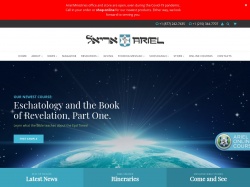This Shabbat is one of four special weeks leading up to Passover that are given names and additional readings. This week’s reading is called Parashat HaChodesh, because we add to the weekly Torah readings a passage out of Exodus 12, which opens with the words hachodesh hazeh, “this month.”
This reading lays the cornerstone for Jewish reckoning of time, our world’s most precious resource. One might have hoards of wealth, but if they have no time, then they have nothing.
Time is the essence of freedom. When someone controls your time, then you are their slave, just as the taskmasters in Egypt dominated the Israelites. When you are the master of your own time, you are truly a free person.
Timekeepers
In Judaism there is a strange tension and rivalry between the “two great luminaries,” the sun and the moon. While both mark time through their cycles, they are very different. In terms of seasons and the natural world, the start of each year is practically the same. With each month, however, there is a dramatic transformation from its beginning to its end.
The Hebrew words for years and months reflect this difference. In Hebrew, a year is called a shanah, which comes from a root meaning “to repeat.” A month is called a chodesh, which means “to become new.”
In Jewish thought, the cycle of the natural world began with the autumn month of Tishrei. This is the turn of the agricultural year, when the harvest is complete and plowing for the next year begins. The month of Tishrei thus symbolizes the static and mechanical world in which we live, the natural laws of physics, and the inevitable sequence of cause and effect. That’s why in Judaism we refer to the first of Tishrei as Rosh HaShanah—the “head of the year.”
If Tishrei reflects the natural and unchanging world that God created in the beginning, then its anti-point on the calendar represents supernatural interruption. Six months from Tishrei is the springtime month of Nisan, which is not just “a month,” but it is haChodesh, “the month.” The sages connect the name Nisan with the Hebrew word nissim, “miracles.” A miracle is an act of divine purpose that contradicts the patterns that we have perceived from the natural world.
Thus, Nisan epitomizes renewal, change, and divine intervention in the created order. While Tishrei is the natural new year, Nisan is the supernatural new year.
At the exodus from Egypt, God distinguished the Jewish people and transformed their relationship to time:
“This month shall be for you the beginning of months. It shall be the first month of the year for you.” (Exodus 12:2)
Notice the deliberate repetition of the phrase “for you” (Hebrew: lachem) in this verse. That is to say, “For everyone else, Tishrei is their dominant month, but not for you. All other nations are limited and governed by natural laws and patterns; your outcomes are the result of direct divine involvement.”
As such, it is no surprise that the exodus from Egypt, which involved the repeated suspension of natural laws, occurred in the month of Nisan. The sages likewise expressed the belief that the ultimate redemption, which will be even greater than the exodus from Egypt, will also occur in Nisan.
Corresponding to this, Yeshua (whose natural life may have begun in Tishrei) experienced the supernatural renewal and transformation of resurrection in the month of Nisan.
Time and Freedom
Today, many of us live in so-called “free societies,” and yet how free are we? Time is an utterly non-renewable resource, and yet we spend most our lives exchanging it for money and property. Our existence is largely characterized by anxiety—not really freedom. As our Passover Haggadah declares, “This year we are slaves. Next year may we be free!”
Sforno explains that the repeated words “for you” in Exodus 12:2 express the freedom that the Israelites acquired when their time became truly theirs. When the Israelites were free to devote their time to the service of HaShem, they truly were no longer slaves of Egypt.
An even greater freedom will come with the ultimate redemption. If time equates to freedom, then ultimate freedom will come in a world where time itself is an unlimited resource. The only way to achieve this is with eternal life, a life that transcends time.
This is one reason why Shabbat is a “foretaste of the age to come.” It is the one day of the week when we stop rushing, stop fighting against time, and stop exchanging it for wealth. Instead, we rest and let time pass without fear or worry.
In Messianic Judaism, we are citizens of that future world, the Messianic Era. That’s where we are at home. Here in this age, we are just travelers. Time travelers, you could say. Where we come from, time is unlimited, and it is a world of nissim—miracles.
Source: First Fruits of Zion



